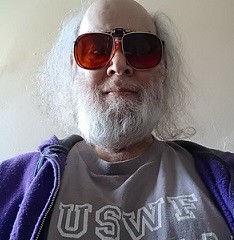Sunday, April 25, 2021
No Holds Barred: Kevin Carter on the Rise and Decline and Rise of Sumo in America (Part Two)
On this edition of No Holds Barred, host Eddie Goldman once again spoke with sumotori, judoka, writer, and intellectual Kevin Carter. This is the second part of a two-part interview.
We spoke with him by phone Wednesday, April 14.
In the 1990s, sumo in Japan began to reach a wider international audience, including in the U.S., with the emergence of several stars who were not Japanese.
"You had Akebono, Musashimaru, Konishiki," Kevin Carter recalled.
Konishiki, an American born in Hawaii, was the first non-Japanese-born wrestler to reach ozeki, the second-highest rank in sumo. Many believed that he would have been promoted to yokozuna, the highest rank, had he been Japanese.
In 1993, Akebono, also an American born in Hawaii, became the first non-Japanese-born wrestler and the first American to be promoted to yokozuna.
Musashimaru, born in American Samoa and who grew up in Hawaii, became in 1999 the second foreign-born wrestler to be promoted to yokozuna.
"And then you had a few other Hawaiians who were in juryo, which is the second top professional division. So these guys were also in the top 50. You had those three top guys, and you had maybe three, four, or five guys who were one step below. And they were all thriving. The Hawaiians were really thriving. The Americans were really thriving," he said.
But that success, though increasing sumo's worldwide appeal, did not sit well with many who ran the Japan Sumo Association, which governs the sport in Japan. The result was a blanket decision which reverberates today.
"And then they banned all foreigners from coming in."
With that, sumo's popularity, and where it was practiced outside Japan, radically changed.
"When that happened, that basically put the kibosh on Hawaii. There was nothing for the Hawaiians to aspire to anymore. They really, they were basically told, 'We're not taking any of you for any reason.'
"There was like a ten-year period where very few foreigners were coming in. They let a few guys in from Mongolia. They let a few guys in from China. But they had cut off other parts of Europe for a little while."
And for some, this discrimination persists.
"They still have an unspoken ban on Hawaiians, just like they have an unspoken ban on Africans and other Black people," he noted.
At the same time, his own active participation in sumo competition was coming to an end. His last match was in 2002, but he still kept up with the sport.
In 2005, it appeared that sumo would take a major step forward as an international sport with the emergence of the World Sumo Challenge. Their inaugural event was held October 22, 2005, at Madison Square Garden, and was shown on tape delay on ESPN2 that December. This was a professional event featuring top sumo wrestlers from around the world, planned to lead to a worldwide tour the following year.
Some of the same people who organized the 1998 "Night of the Giants" sumo event in Atlantic City, New Jersey, were also involved in the World Sumo Challenge. One of them was Kevin Carter's old sumo coach, Yoshisada Yonezuka, who ran the Cranford Judo Karate Center in Cranford, New Jersey, and who also had trained Manny Yarbrough, who also was retired from sumo by this time.
It would have seemed logical for the organizers of the World Sumo Challenge to have brought in Kevin Carter, with his experience and record in many areas of sumo. He also lived reasonably close to New York City. But, surprisingly to him, the call never came.
With that snub, it was the end of the line for him in sumo. He said his attitude then was, "Fuck sumo."
While the World Sumo Challenge drew some 8000 mainly enthusiastic fans to Madison Square Garden, their 2006 tour was a bust. Now called the World Sumo League, they had no TV deal, fan attendance in the arenas was quite low, and the tour was abandoned midway, never to be resumed.
All these blunders drove one of its most serious devotees, Kevin Carter, from the sport. He no longer even followed it closely or watched sumo events.
The appeal of the sport, though, and his love of sumo, were still lingering. In more recent years he has done some refereeing and judging, and was asked to be a referee at the 2020 U.S. National Sumo Championships, organized by the U.S. Sumo Federation. He wanted to do this, but was only unable to do so because of job commitments. In the meantime, he also became a black belt in judo.
As we have noted many times, there has been a marked and recent revival of sumo in the U.S. New clubs have been formed and new tournaments have been held, a growth impeded mainly by the coronavirus pandemic. With mass vaccinations going on in the U.S, expect sumo to thrive even more, and, unlike in Japan, among a very diverse cross-section of people.
And while just what Kevin Carter will do in sumo today is not clear, he wants to, and certainly should, return to playing an important role in the sport.
"I really would enjoy seeing that revival and being part of that revival," he stressed.
So this story of Kevin Carter and his love of sumo is not yet over. There hopefully will be some more fond chapters to come, because, as the late Teddy Pendergrass sang:
"So good, so good, so good,
"When somebody loves you back."
Please also subscribe to the No Holds Barred page on Patreon for much more No Holds Barred content.
You can play or download No Holds Barred on Podomatic and the Internet Archive. If one link does not work, please try another.
No Holds Barred is also available on these sites and apps:
The Podomatic Podcast Player app is available for free, both for Android at Google Play, and for iOS on the App Store.
The No Holds Barred theme song is called "The Heist", which is also available on iTunes by composer Ian Snow.
No Holds Barred is sponsored by:
LenneHardt.com, the home of Lenne Hardt, the legendary MMA and sports announcer, voice actor, singer, actress, and comedienne. Lenne is also known for her jazz vocals with her Lenne Hardt Jazz Cabaret Band. For more information, to book her, or to order a custom message from her, go to LenneHardt.com.
Skullz Fight Shop, home of the Skullz Double-End Bag, the perfect punching bag for your combat sports training. Skullz Double-End Bags provide a realistic striking target, and help improve speed, distance, and timing skills. Hang it and hit it right out of the box! No pump required. Skullz Fight Shop - Advancing combat sports equipment for the next generation of fighters. For more information, go to https://skullzfightshop.com.
Adolphina Studios. Original art prints and handcrafted fine jewelry. For more information, go to https://www.etsy.com/shop/AdolphinaStudios.
Labels: Eddie Goldman, Hawaii, Japan, Kevin Carter, No Holds Barred, sumo, wrestling
Comments:
Post a Comment
















